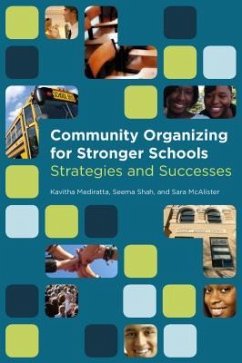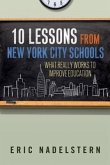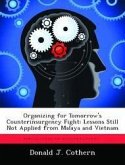In cities across America, community organizations are taking up the cause of public school reform. Their efforts are radically transforming the role of young people, parents, and community members in public education. As the results of their campaigns become more visible, community groups are igniting interest and gaining support among education reform advocates, policy makers, and private foundations. Drawing on a six-year national study, Community Organizing for Stronger Schools offers a richly textured analysis of community organizing for school reform. The authors examine the role of organizing in building social and political capital and improving educational outcomes for students in some of the nation's most challenged school districts. They delineate the strategic choices and organizational characteristics that foster successful initiatives and consider how community organizing can support increased civic engagement and sustained educational reform. Finally, they discuss the challenges facing this burgeoning field in a new era of American politics. "The authors of Community Organizing for Stronger Schools make a compelling argument that organizing can, and does, strengthen public education. This is the first analysis to document the link between community organizing and improved student educational outcomes. It also identifies effective strategies to mobilize communities, build coalitions, and collaborate with educators. In the end, this book offers a new paradigm for understanding how urban schools and the communities they serve can work together to improve education for the students who need it most. This book is a 'must-read' for school reformers and policy makers, indeed, for all who care about educational justice." -- Mark Warren and Karen L. Mapp, codirectors, Community Organizing and School Reform research project, Harvard Graduate School of Education "This is a welcome contribution, original and challenging. I don't believe any previous book has shown so clearly the wide variety of ways organizing can reshape schools. Nor has any book drawn together such an impressive body of data, much of it quantitative and longitudinal, to support claims of organizing's effectiveness. At a time when much of the national discussion proceeds as if top-down models were the only way to think about reform; this volume offers a much-needed alternative vision." -- Charles M. Payne, Frank P. Hixon Professor, School of Social Service Administration, University of Chicago Kavitha Mediratta is currently an education program officer at the New York Community Trust and formerly principal associate at the Annenberg Institute for School Reform at Brown University. Seema Shah is a principal associate at the Annenberg Institute for School Reform at Brown University. Sara McAlister is a research associate at the Annenberg Institute for School Reform.
Hinweis: Dieser Artikel kann nur an eine deutsche Lieferadresse ausgeliefert werden.
Hinweis: Dieser Artikel kann nur an eine deutsche Lieferadresse ausgeliefert werden.








